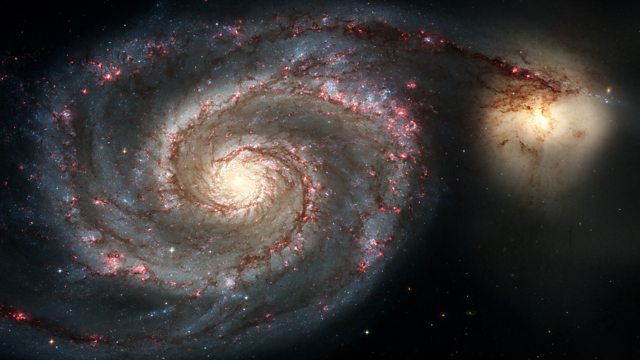The Great Telescopes and Evolution
Professor Simon Schaffer tells of the astronomers who grappled with evolution long before Darwin, and who tried to settle the argument using the biggest telescope in the world.
Today, astronomers believe the universe is a violent, constantly changing place. But it was not always the case.
At the beginning of the 19th century, many believed fervently that the celestial sky was a constant, divinely perfected, completed creation.
But as telescopes got larger, the mystery of the number, origin and role of the "nebulae" - those colourful, cloud-like smudges on the sky – grew and grew. Were they really vast clouds of gas and dust as they sometimes appeared? Or were they merely closely packed, very distant clusters of stars, as some of them allegedly appeared when magnified through the great reflecting telescopes?
When some astronomers and writers suggested they were in fact a vision of creation in action, matter condensing to form stars and planets like our own, some establishment religious figures cried foul, fearing the social implications.
Could bigger telescopes resolve the crisis?
For most of the 19th century, the biggest telescope in the world was in Birr, Ireland, then known as Parsonstown. It was built by an Anglo-Irish nobleman, Willam Parsons, Earl of Rosse, in the midst of the Irish famine. 50 feet long, 6 feet in diameter, the monster instrument was dubbed "The Leviathan".
But even thus equipped, in the days before photography and spectroscopy, observers could only describe and sketch what they saw, and it was hard to be objective.
As Simon Schaffer, James Bennet, and Chris Lintott narrate, the debate as to the truth of the "Nebular Hypothesis", and the concern as to whether the Irish astronomers really saw what they claimed to see, paved the way for the Darwinian debates in the coming decades.
Producer: Alex Mansfield
(Photo: NASA Hubble Space Telescope image released 25 April, 2005 shows the spiral galaxy M51 also known as the Whirlpool Galaxy. Credit: NASA via AFP/Getty Images)
Last on
More episodes
Previous
Broadcasts
- Mon 10 Aug 2015 18:32GMT�鶹������ҳ��� World Service Online
- Mon 10 Aug 2015 23:32GMT�鶹������ҳ��� World Service Online
- Tue 11 Aug 2015 02:32GMT�鶹������ҳ��� World Service Europe and the Middle East & Australasia only
- Tue 11 Aug 2015 04:32GMT�鶹������ҳ��� World Service Online, South Asia, Americas and the Caribbean & UK DAB/Freeview only
- Tue 11 Aug 2015 05:32GMT�鶹������ҳ��� World Service East Asia
- Tue 11 Aug 2015 06:32GMT�鶹������ҳ��� World Service Europe and the Middle East
- Tue 11 Aug 2015 12:32GMT�鶹������ҳ��� World Service except Americas and the Caribbean & Australasia
- Tue 11 Aug 2015 13:32GMT�鶹������ҳ��� World Service Australasia
Space
The eclipses, spacecraft and astronauts changing our view of the Universe
The Curious Cases of Rutherford and Fry
Podcast
-
![]()
Discovery
Explorations in the world of science.



